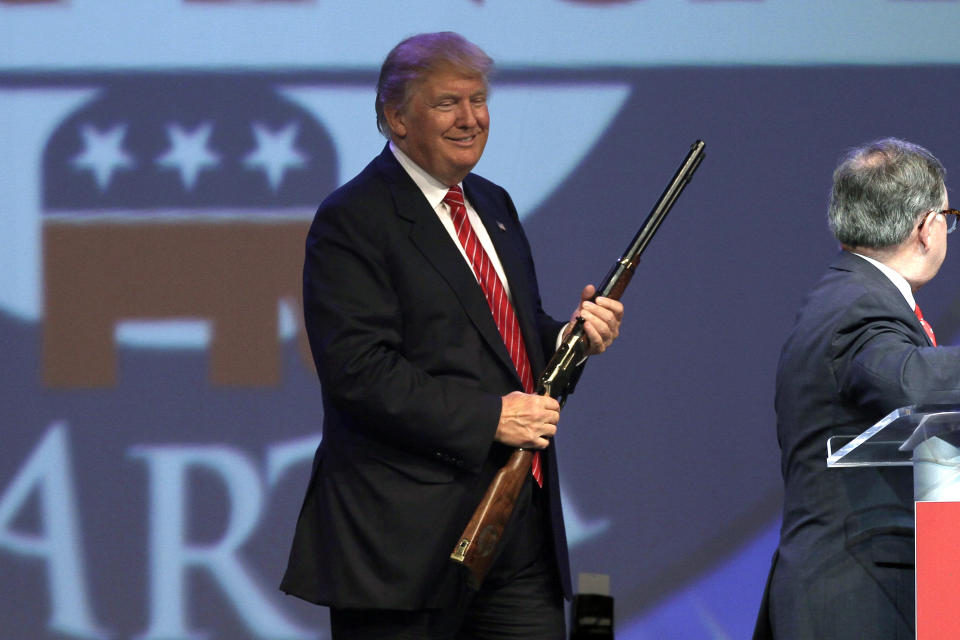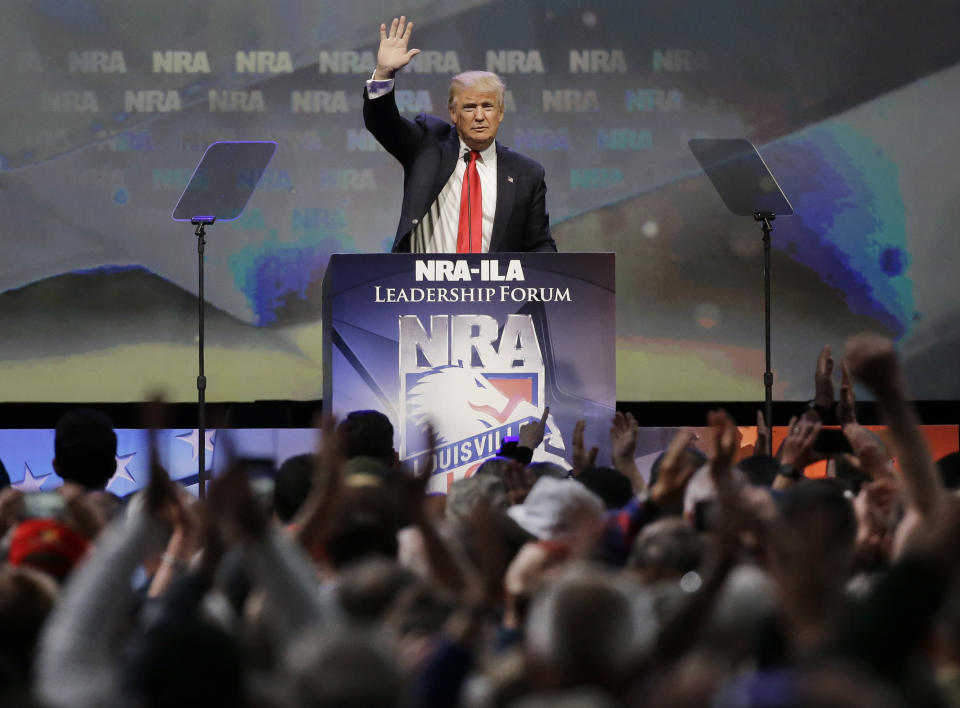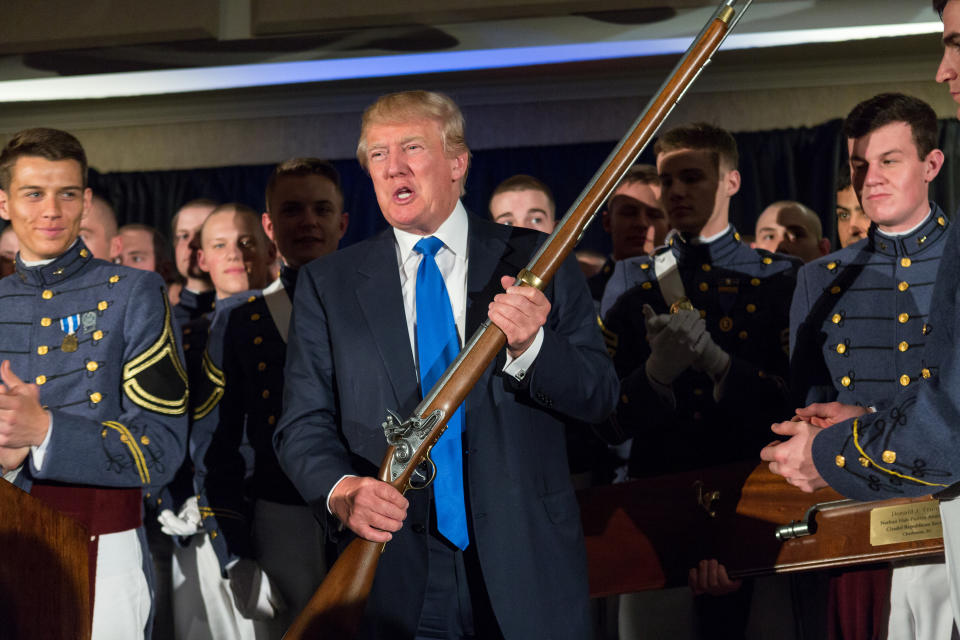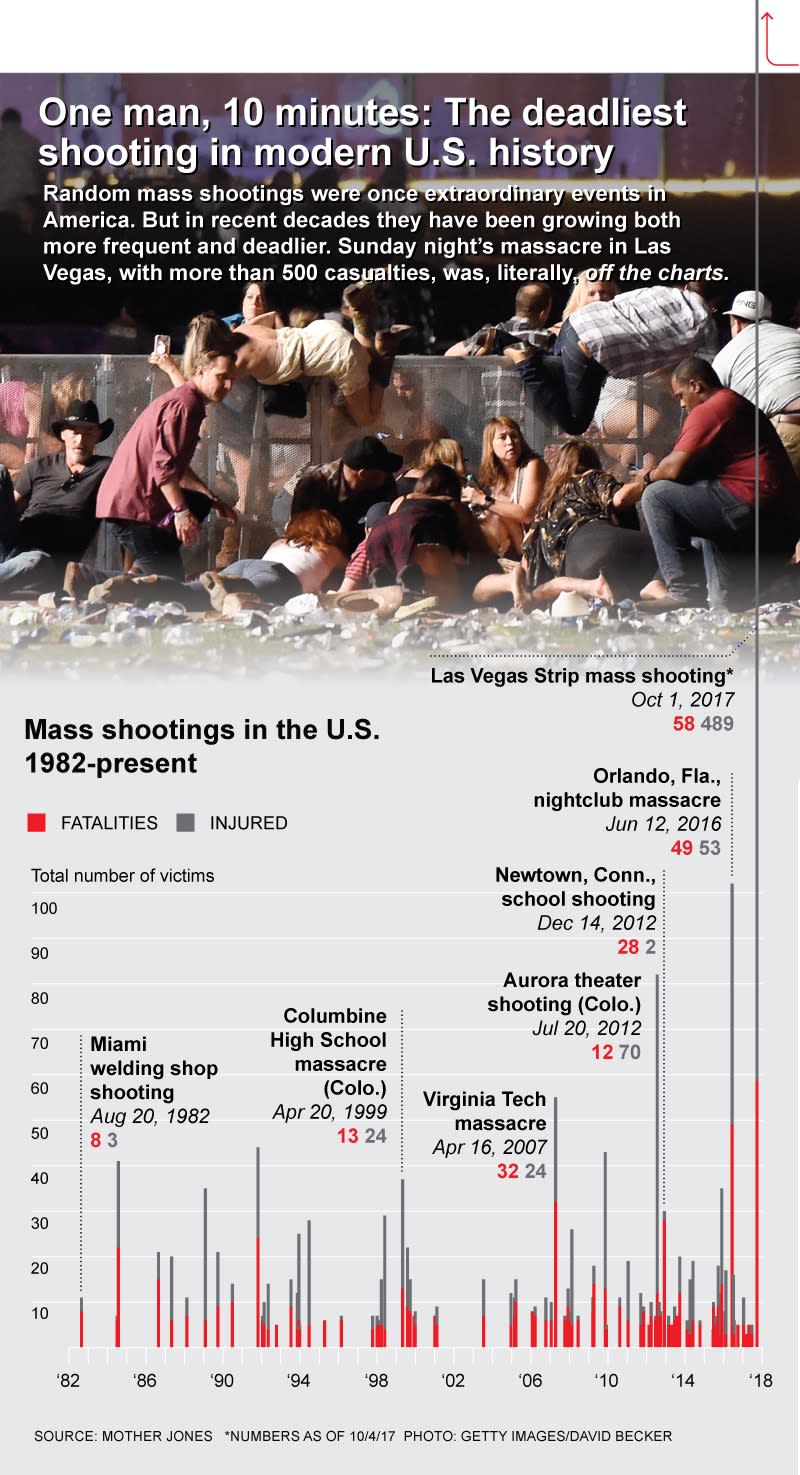Trump on gun control: We’ll talk about it. Later.
President Trump seemed to open the door, slightly, to consideration of gun-control legislation Tuesday morning, but his record as a candidate and as president suggest it is very unlikely. It almost certainly — like many of the things he has promised — lies in the indeterminate future.
When asked on Tuesday morning whether the mass shooting in Las Vegas would prompt new gun legislation, Trump said, “We’ll be talking about gun laws as time goes on.”
He was speaking to reporters at the White House, a day after 58 people were murdered and another 489 were injured by a shooter on the 32nd floor of the Mandalay Bay casino and hotel. Like many of his positions through the years, Trump’s views on gun control had been malleable before snapping into the orthodoxy of the Republican consensus when he began to seek the GOP’s nomination for the presidency.
In the aftermath of the deaths at Sandy Hook, former President Barack Obama spoke at a prayer vigil in Newtown, Conn. Obama expressed his condolences, but also called on legislators to pass laws that could help prevent future tragedies.
“President Obama spoke for me and every American in his remarks in Newtown, Connecticut,” wrote Trump in December 2012. While it’s possible he was simply agreeing with the first, nonpolitical part of Obama’s remarks, his response to someone replying, “Good for you, Donald. Stop the insanity” was “Trying!”

“I’m not a hunter and don’t approve of killing animals,” wrote Trump in March of 2012. “I strongly disagree with my sons who are hunters, but they acted legally and did what lots of hunters do.”
Trump has had a concealed carry permit since 2010. As a candidate in 2015, he said that he carries “on occasion — sometimes a lot,” adding that he likes to be unpredictable. Trump also said, “I might feel more comfortable” if his employees brought firearms to work.
“I generally oppose gun control, but I support the ban on assault weapons and I also support a slightly longer waiting period to purchase a gun,” he wrote in his 2000 book, “The America We Deserve.” “With today’s Internet technology we should be able to tell within seventy-two hours if a potential gun owner has a record.”
A decade and a half later, in the midst of the Republican primary, he had reversed his position.
“Opponents of gun rights often use a lot of scary descriptive phrases when proposing legislative action against various types of weapons,” wrote Trump in “Crippled America,” which was released in November 2015. “Ban ‘assault weapons’ they say, or ‘military-style weapons,’ or ‘high-capacity magazines.’ Those all do sound a little ominous, until you understand what they are actually talking about are common, popular semiautomatic rifles and standard magazines that are owned and used by tens of millions of Americans.”
That passage presaged the positions of Trump as a candidate and in office, which have aligned with the National Rifle Association. The NRA donated more than $30 million in support of Trump’s election and endorsed him in May 2016, months earlier than they came out in support of Mitt Romney and John McCain in the 2012 and 2008 election cycles. He was the first president since Ronald Reagan to speak at the gun lobbying group’s leadership forum, stating that the NRA had a “true friend and champion in the White House.”
The NRA was quiet about the Las Vegas shooting, but it postponed an ad buy in Virginia, which has contests for governor and attorney general in next month’s election.

During the general election campaign, Trump also suggested that the “Second Amendment people” might be able to do something about the judicial choices of a hypothetical President Hillary Clinton. The remarks — alluding to an attack on the Democratic candidate — sparked outrage, a condemnation from the Clinton campaign and an acknowledgment from the Secret Service, but did not elicit an apology from the Trump camp.
In one of his first acts as president, Trump signed a bill revoking an Obama-era rule that had made it more difficult for mentally ill Americans to buy guns. Weeks before the Las Vegas shooting, the administration eased laws that made it easier for American gun manufacturers to sell small arms abroad.
On Monday, press secretary Sarah Sanders said the White House was not ready to talk about policy measures to prevent mass shootings, but said they knew what kind of laws they did not want to pursue.
“I think one of the things that we don’t want to do is try to create laws that won’t create — or stop these types of things from happening,” said Sanders. “I think if you look to Chicago, where you had over 4,000 victims of gun-related crimes last year — they have the strictest gun laws in the country. That certainly hasn’t helped there. So, I think we have to — when that time comes for those conversations to take place — then I think we have to look at things that may actually have a real impact.”
Chicago’s gun laws haven’t been the strictest in the country since at least 2013, when Illinois voted to allow concealed carry. And, obviously, they can’t prevent someone from obtaining a gun in another state. Many of the guns used in Chicago come from outside the state, where gun laws are even laxer.

Steve Bannon, the Breitbart News executive who served in the Trump campaign and in the White House, told Axios any consideration of gun control laws by the president would be “impossible” and “the end of everything.”
Trump, however, did cut a deal with Sen. Chuck Schumer and Rep. Nancy Pelosi to raise the debt ceiling and keep the government running. Do Democratic legislators believe similar collaboration is possible on guns?
“The task force on gun violence prevention has drafted legislation,” said Mike Thompson, D-Calif., chair of the Gun Violence Prevention Task Force, when asked at a press conference whether Democrats would reach out to Trump. “It’s being circulated amongst our members today, asking specifically that the president join us.”
“We ask him to join us to try and figure out a solution to help prevent gun violence. That letter will go out today.”
Schumer, in Tuesday morning remarks on the Senate floor, said: “I am also calling on President Trump to bring together the leaders of Congress and let both sides know he is willing to address this issue of safety head on. He should tell members of his party that it’s time to work addressing the epidemic that costs the lives of more than 30,000 Americans a year. I’m glad the president is going to Las Vegas. That’s a good idea. But he should take it a step further. Call us together, and lead this nation in some rational laws about gun safety that the overwhelming majority of Americans — Democrat, Republican and Independent support.”
Liz Goodwin contributed to the reporting of this story.

Read more from Yahoo News:


